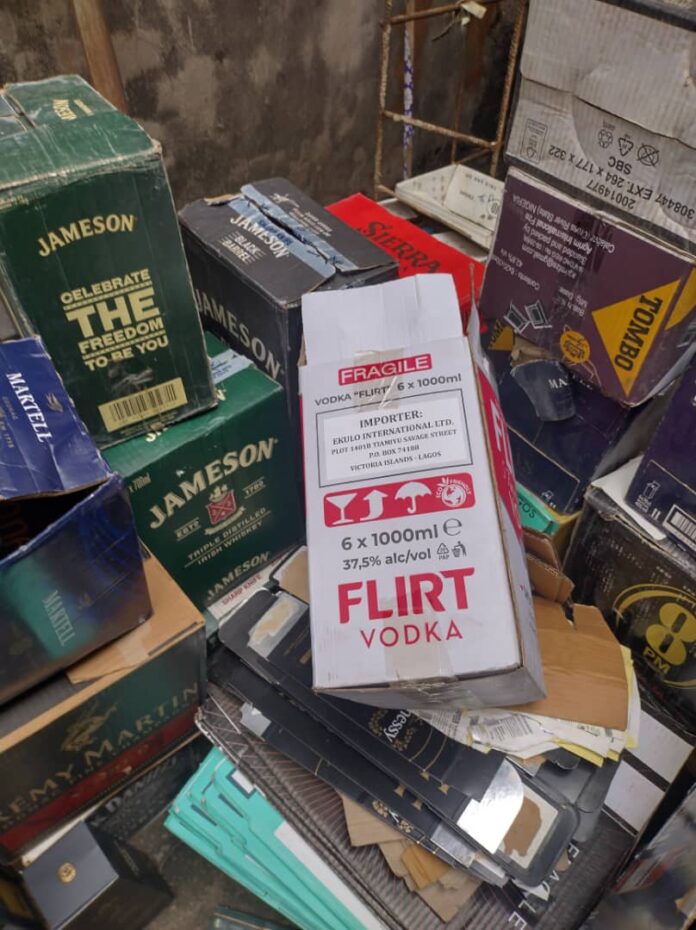The National Agency for Food and Drug Administration and Control (NAFDAC) has taken significant action against the production and distribution of counterfeit alcoholic beverages in Lagos.
A statement issued by NAfDAC said its officials raided several packing stores and rooms in the Oke-Arin market, uncovering makeshift factories where various brands of alcoholic drinks were being illegally produced, packaged, and distributed.
During the raid, NAFDAC seized over 2,000 cartons of empty bottles, along with already packaged drinks, a mini plastic mixing tank, an improvised filter, and other packaging materials. Three suspects were arrested in connection with the illegal operation. The estimated street value of the seized items is N200 million.
This operation is part of NAFDAC’s ongoing efforts to protect public health and ensure the safety of consumers. The agency urged the public to remain vigilant when purchasing alcoholic beverages, warning that these counterfeit products pose serious health risks.
The statement said, “After thorough surveillance, the officers discovered that several packing stores and rooms in Oke-Arin market had been converted into makeshift factories where different brands of alcoholic drinks were being produced, packaged, and distributed in the open market”
The makeshift factories discovered by NAFDAC in Oke-Arin market were found to be producing counterfeit versions of popular alcoholic drinks. These illegal operations not only undermine legitimate businesses but also put the health of unsuspecting consumers at great risk. Counterfeit alcohol often contains dangerous substances that can lead to severe health issues, including kidney and liver damage.
NAFDAC has assured the public that the investigation is ongoing and that the suspects will be prosecuted upon its conclusion. The agency’s swift action has been praised by many Nigerians who have expressed concerns about the increasing prevalence of counterfeit products in the market.
On social media, the raid has sparked widespread discussion and concern. Many users have shared their experiences of encountering counterfeit alcohol and other products, expressing frustration over the dangers posed by these illegal activities. Some have called for stricter enforcement and harsher penalties for those involved in the production and distribution of counterfeit goods.
One Twitter user, @BoeingB54, expressed deep frustration with the situation, saying, “All we do is ruin ourselves with these criminal activities. It’s time to stop this madness before more lives are lost.” Another user, @oyadnimi, urged the public to be cautious, stating, “Most supermarkets are in bed with these criminals. Just drink water for now, or else your kidney will fail you. These people do not care; they’d rather make money from your corpse than stop this criminal behavior.”
The raid has also led to calls for better regulation and support for small and medium-sized enterprises (SMEs) that want to enter the alcohol production industry legally. Some social media users suggested that NAFDAC should offer guidance to individuals who are interested in producing and bottling alcohol legally, rather than solely focusing on enforcement. This, they argue, would help boost productivity and reduce the prevalence of counterfeit products.
The issue of counterfeit alcohol is not new in Nigeria. Over the years, there have been numerous reports of fake alcoholic beverages causing serious health problems and even death. The high demand for alcohol in the country, coupled with the economic challenges faced by many Nigerians, has created a lucrative market for counterfeiters. These illegal operators often produce substandard products in unhygienic conditions, with little regard for the safety of consumers.
NAFDAC’s efforts to crack down on counterfeit alcohol are part of a broader strategy to address the problem of fake and substandard products in Nigeria. The agency has been working to raise public awareness about the dangers of counterfeit goods and has implemented measures to improve the regulation of food and drugs in the country.
However, some Nigerians remain skeptical about the effectiveness of these efforts. Concerns have been raised about the ability of NAFDAC and other regulatory bodies to effectively monitor and control the market, particularly in light of the widespread availability of counterfeit products.
One Twitter user, @Goddleader, voiced these concerns, stating, “NAFDAC doesn’t need intelligence reports to address what’s obvious if they’re ready to take action. All alcoholic beverages and products sold by these so-called ‘developers’ are fake! Everything they produce or sell is direct economic sabotage and poses a health hazard to citizens.”

